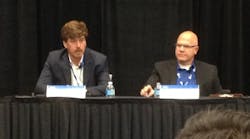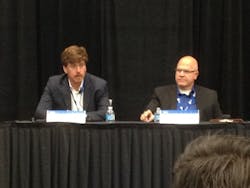Mike Bacidore is the editor in chief for Control Design magazine. He is an award-winning columnist, earning a Gold Regional Award and a Silver National Award from the American Society of Business Publication Editors. Email him at [email protected].
Cisco’s Paul Didier (left) and Nokia’s Mark Cudak share their thoughts on the IIoT at NIWeek in Austin.
Each August, engineers and designers gather in the Live Music Capital of the World and enthusiastically bear the triple-digit heat to drink from the cool, refreshing hose of industrial innovation and listen to presentations of the newest applications of National Instruments’ technology. This year, NIWeek in Austin, Texas, focused on the latest developments surrounding the Industrial Internet of Things (IIoT) and big analog data (BAD).
“We’re in the early stages of the Internet of Things,” said Jeff Kodosky, one of the co-founders of NI and the “father” of its LabView platform. “The IIoT is about connecting machines and systems to improve reliability, productivity and safety. Sensors and devices will create huge amounts of data. Big analog data is fundamentally unabated. Sensors and actuators connect to nodes at the edge. LabView is the platform for big analog data and the IIoT.”
NI sees big opportunities in BAD, which comes from physical-world measurements from devices on the edge of the network. And the ability to process that data at the edge or closer to it could greatly reduce the amount of bandwidth that will be necessary to accommodate the exabytes of data the IIoT will require. Most predictions foretell 50 billion connected devices by 2025.
“We’ll have to have ultra-deep and ultra-dense networks and ultra-reliable systems,” warned Mark Cudak, principal research specialist at Nokia, one of the many IIoT heavy hitters who spoke at NIWeek.
“Devices need to be software-upgradable, or at least modular so an obsolete device can be swapped out,” said Greg Gorman, director, IoT solutions group, at IBM. “The companies that are paying attention to the IoT are worried about how this will change their businesses. The companies that aren’t worried will be out of business in five to 10 years. Our CEO wouldn’t have spent $3 billion if she didn’t see an opportunity in the IoT.”
Also read: IBM, NI create condition monitoring and predictive maintenance testbed for the loT
Security is one of the issues that companies must address when it comes to the IIoT. “Security isn’t a problem,” Gorman assured. “It’s an engineering solution waiting to be done. There’s a stack of challenges. We have to establish things like security trust levels. I’d want different kinds of security software, so, if one software is breached, there’s another software behind that. Or how do you detect when you’re not receiving the proper data? Safety, security and veracity are being worked on. I hope no organization starts to create too many standards too early. I think we still have a lot to learn.”
[sidebar id=3]
“Industry is behind when it comes to security,” agreed Paul Didier, solutions architect manager at Cisco. “I’ve been working with companies, and you’ll be seeing things later this year. We’re really excited about the time-sensitive networks. We need to bring security to them. Engineers of the future will need to be much more in tune with these network technologies.”
Michael Lee, director of testbeds for the Industrial Internet Consortium (IIC) explained how its testbeds are key in fostering collaboration, interoperability and experimentation. “National Instruments has been an active member,” he said. “NI is involved in three testbeds right now.”
One of these testbeds has been developed jointly by IBM and NI around predictive maintenance (PdM). Designed to create the optimal architecture for PdM, the testbed addresses scalability, cloud integration, security, interoperability and end-to-end analytics. “Edge analyses plus enterprise analyses equals big-analog-data solutions,” said Gorman. The testbed includes NI’s InsightCM Enterprise, IBM Maximo asset management software, IBM Bluemix cloud app and IBM Watson analytics solution.
This is one example. But the heart of the IIoT applications discussed at NIWeek are made possible by NI’s LabView reconfigurable I/O (RIO) architecture platform, which brings intelligent systems together with analytical software tools. “As the Industrial Internet of Things continues to impact the way the world connects, communicates and optimizes smart systems, embedded engineers face growing and evolving networking, performance and security demands and increased pressure to get to market faster, all while reducing development costs,” said Jamie Smith, director of embedded systems at NI. “NI’s LabView RIO architecture delivers a complete platform so engineers can quickly design, prototype and deploy embedded systems for advanced monitoring and control applications in the IIoT.”
NI announced its new product lines of CompactRIO, FlexRIO, and Single-Board RIO controllers that integrate embedded technologies from Xilinx and Intel to deliver performance and flexibility which helps system designers and machine builders solve control and monitoring challenges. The CompactRIO Controller features a 1.91 GHz Intel Atom quad-core processor, a Xilinx Kintex-7 FPGA and four or eight slots of C Series I/O modules for control and monitoring in harsh environments. The new controllers are based on LabView RIO architecture and compatible with LabView 2015, LabView FPGA and NI Linux Real-Time, which is designed to enable advanced security features for IIoT applications.






